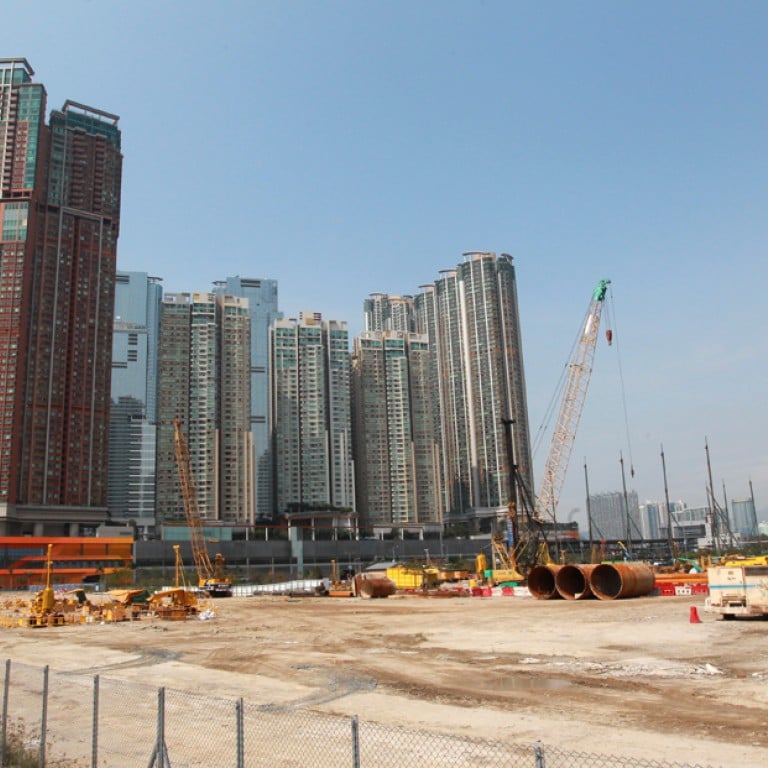
Change accounting rules to keep land revenue windfalls separate, urges government adviser
Leading adviser suggests one-off income should not be used to cover recurrent expenses, giving clearer picture of state of government finances
A leading economist advising the government on fiscal policy is urging it to change accounting rules to stop one-off windfalls from land revenue being used to fund recurrent spending.

His call comes amid warnings that healthy government surpluses will give way to a structural deficit due to costs associated with the city's ageing population.
Liu, a member of a government-appointed working group on long-term fiscal planning, wants the government to split its main account in two.
There would be an operating account for recurrent spending and income and a capital account for one-off expenditure and income, with land revenue going to the latter. The public would be briefed on the balance of both accounts each year, instead of the overall picture.

Sources close to Financial Secretary John Tsang Chun-wah say the idea has won support among working group members.
Liu said separating revenue from land sales and land-lease variations, which fluctuate dramatically from year to year, would mean the government's accounts would better reflect the true state of the public finances.
"The basic principle is that we shouldn't use one-off revenue to pay for recurrent expenses. It's not going to be sustainable.
"The government should strive to balance the two accounts," said Liu, director of Chinese University's Institute of Global Economics and Finance.
"The merit [of the idea] is that it will reduce the fluctuation in budget surpluses. In effect, the government will face less pressure to commit to unnecessary handouts and be less conservative in helping those really in need." His comments came after Chief Executive Leung Chun-ying announced new recurrent spending of more than HK$10 billion per year in his policy address on Wednesday.
The extra spending, including a subsidy for working poor families, will take the rise in recurrent government spending since Leung took office in 2012 to about HK$20 billion per year, equivalent to 7 per cent of total recurrent expenditure for this year.
With Leung focusing his spending on poverty alleviation, Tsang is facing pressure to help the middle class when he reveals his budget next month. But under his proposal, Liu said, the government would have little room to spend more unless output also grew, raising tax revenue.
With land revenue and infrastructure spending taken out, the government's total surplus since 1997 would drop to HK$286 billion, from HK$343 billion. That would have left an average of HK$18 billion per year for extra recurrent expenditure.
With the public better informed, Liu argues, political pressure to offer "unnecessary" handouts will be weaker.
Land revenue, which will make up about 15 per cent of government revenue for this fiscal year, goes into the Capital Works Reserve Fund. The fund is meant to be for non-housing infrastructure and land acquisition, but the government can dip into it to fund recurring expenses.
Money left unused is added to the budget surplus.
Land revenue has helped the government earn large surpluses and build its reserves in recent years, despite predictions by Tsang that the budget would slip into deficit. But land revenue varies. The biggest total recorded since the handover - HK$84.6 billion in 2011/12 - is 15 times the total of HK$5.4 billion recorded in the worst year, 2003/04.
While the government's recurrent income - from sources such as salaries and property tax - has consistently been higher than recurrent spending, it has sometimes had to dip into the fiscal reserve to make up a shortfall. The overall surplus for the fiscal year ending in March is expected to be about HK$32 billion under the proposed rules, down from HK$64.8 billion under the old rules.
Commenting on the long-term projections of the working group, Liu said one way to avoid a future deficit was to freeze the services offered. "It means there will be no 15-year free education, no new drugs and the government will maintain only the same standard of elderly services. Can we accept that?"
A spokesman for Tsang said last night that the finance chief would consider the working group's proposals.
Government expenditure has risen by 5.2 per cent per year on average since 1997, almost double the 2.8 per cent annual growth in revenue. The reported last week that Tsang will warn that the city could use up its fiscal reserves in 20 years if nothing is done to reduce the impact of the ageing population.
One of those who accused the government of scare tactics said he agreed with the need to find a better way to calculate the budget surplus.
Dr Brian Fong Chi-hang, vice-chairman of the SynergyNet think tank, suggested setting up a fiscal stabilisation fund comprising revenues that tend to fluctuate, such as land premiums, stamp duty and investment income. The fund's performance over about seven years could then be used as a reference to set the level of recurrent expenses.

